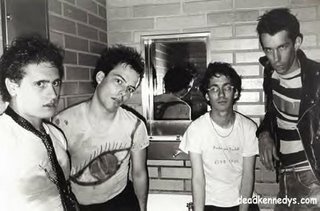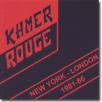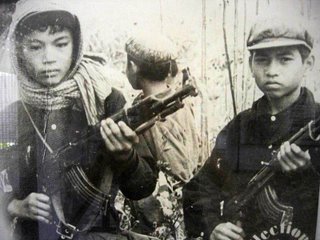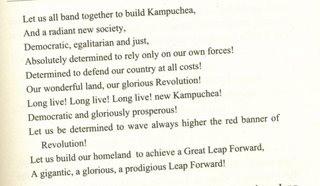Friday, April 28, 2006
Thursday, April 20, 2006
Songs From Democratic Kampuchea
Always Remember our Revolutionary Living Tradition
Best Wishes to the Great Kampuchean Revolution
Best Wishes to the Victory Day of April 17
Bravery of Construction Revolutionary Soldiers
Children's Letter
Commitment to Follow Great Bravery of Kampuchean People
Do not Forget the Fresh Blood of our Soldiers
Estranged Wife
Fighting Morality of Kampuchean Revolutionary Youth
Flying a Flag above the Mekong River
Harvest the RiceDemocratic Kampuchea National Anthem
Thursday, April 13, 2006
Khieu Ponnary

Khieu Ponnary, (លោកខៀវ ប់នណារី) the wife of Po Pot, may have been one of the most astute Marxist women in the Marxist Leninist nation world. She was his mentor when he was in Paris and had joined the Marxist circle that would later become the Central Committee of the Communist Party of Kampuchea. She was considered one of the more intellectual members of the inter circle. She as born 1920 in Phnom Penh, died July 1, 2003 in Pailin.
She became the spouse of Pol Pot in 1956. Khieu Ponnary was the first female Cambodian to graduate from high school, and the first Khmer woman to earn a bachelor's degree from Phnom Penh's elite Lycee Sisowath. She was the first Khmer woman to receive a bachelor's degree in Paris, France.
She probably wrote a lot of articles for the Party’s paper, but she never signed them. She was head of the national women's association of Democratic Kampuchea.
She had mental problems that began right before the CPK took control of the country and she went to a hospital, in Beijing, with mental illness. Her husband left her in the 1980s for a younger wife, Meas.
Whether she would have had a good impact or a bad one is still unknown. Since she wasted away in a mental hospital until after the demise of the Democratic Kampuchea rebel movement. She lived with relatives until she died. We may never know if she could have improved the way things were going. Few today held her responsible for Democratic Kampuchea’s crimes because she can’t even remember that period of time.
Wednesday, April 12, 2006
Tuesday, April 11, 2006
A revolution of children

We formed an army of children and young people because they were uncorrupted by the past and they did not have so many attachments to the old ways of doing things. Young people are always more open to new ideas. Old people may become set in their ways. It is much easier to retrain younger people, the younger the better. As we often said: "It is easier to mold clay when it is still soft and wet."
T. Rex - Children Of The Revolution
YeahWell you can bump and grindIt is good for your mind
Well you can twist and shout let it all hang out
But you won't fool the children of the revolution
No you won't fool the children of the revolution, no no no
Well you can tear a plane in the falling rain
I drive a rolls royce 'cos it's good for my voice
But you won't fool the children of the revolution
No you won't fool the children of the revolution, no no no - yeah!
But you won't fool the children of the revolution
No you won't fool the children of the revolution
No you won't fool the children of the revolution
No you won't fool the children of the revolutionNo way, yeah, wow!
Thursday, April 06, 2006
Wednesday, April 05, 2006
Tuesday, April 04, 2006
Some still pay for doubting the mainstream news media
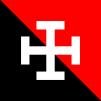
Pol Pot is probably one of the most discredited revolutionary Marxist leaders of the 20th Century. His four year government is now considered a disaster. Outside of Cambodia, he has few, if any admirers. His crimes are almost unanimously acknowledged, although the scope and numbers are still debated by some people. No one doubts that Poll Pot, under his Communist Party of Kampuchea, unnecessarily executed innocent people, overworked some of them, starved some of them, even tortured some. These crimes may have caused up to a million unnecessary deaths.With that in mind, it would seem a dead subject to debate the merits of Pol Pot's government. But it isn't. There seems to be a chorus of people from both the right and the left, who want to castigate, ridicule and discredit anyone who wrote anything positive about the Pol Pot years, regardless of when they wrote it. That would include myself for an article I published opposing Vietnam's invasion of Cambodia and occupation lasting through the 1980s. The article is outdated by now, but don't tell anti-Pol Pot hardliners who continue to trash Noam Chomsky and many other academic and political activists who originally defended Pol Pot's Democratic Kampuchea.Typical are the following:
The Khmer Rouge Canon 1975-1979:
The Standard Total Academic View on CambodiaSophal Ear:
"-most effective apologists in the West""-an unequivocal record of complicity existed between a generation of academics who studied Cambodia and the Khmer Rouge."
The hypocrisy of Noam Chomsky by Keith Windschuttle:
"Although information was hard to come by, Chomsky suggested in an article in 1977 that post-war Cambodia was probably similar to France after liberation at the end of World War II when thousands of enemy collaborators were massacred within a few months. This was to be expected, he said, and was a small price to pay for the positive outcomes of the new government of Pol Pot. Chomsky cited a book by two American left-wing authors, Gareth Porter and George Hildebrand, who had "presented a carefully documented study of the destructive American impact on Cambodia and the success of the Cambodian revolutionaries in overcoming it, giving a very favorable picture of their programs and policies."By this time, however, there were two other books published on Cambodia that took a very different line. The American authors John Barron and Anthony Paul called their work Murder of a Gentle Land and accused the Pol Pot regime of mass killings that amounted to genocide. Franois Ponchaud's Cambodia Year Zero repeated the charge.Chomsky reviewed both books, together with a number of press articles, in The Nation in June 1977. He accused them of publishing little more than anti-communist propaganda. Articles in The New York Times Magazine and The Christian Science Monitor suggested that the death toll was between one and two million people out of a total population of 7.8 million. Chomsky mocked their total and picked at their sources, showing some were dubious and that a famous photograph of forced labor in the Cambodian countryside was actually a fake."
"Averaging Wrong Answers: Noam Chomsky and the Cambodia Controversy"
By Bruce Sharp:
"A peculiar irony is at the heart of this controversy: Noam Chomsky, the man who has spent years analyzing propaganda, is himself a propagandist. Whatever one thinks of Chomsky in general, whatever one thinks of his theories of media manipulation and the mechanisms of state power, Chomsky's work with regard to Cambodia has been marred by omissions, dubious statistics, and, in some cases, outright misrepresentations. On top of this, Chomsky continues to deny that he was wrong about Cambodia. He responds to criticisms by misrepresenting his own positions, misrepresenting his critics' positions, and describing his detractors as morally lower than "neo-Nazis and neo-Stalinists."(2) Consequently, his refusal to reconsider his words has led to continued misinterpretations of what really happened in Cambodia. Misconceptions, it seems, have a very long life."
And:
"The first evidence of this is apparent in December 1972, in Chomksy's introduction for Cambodia in the Southeast Asia War by Malcolm Caldwell and Lek Tan. In the introduction, Chomsky writes, quite rightly, "The misery and destruction for which Nixon and Kissinger bear direct responsibility are crimes that can never be forgotten..It is a rather drastic jump to move from remembering the crimes of Nixon and Kissinger, to suggesting that the Khmer Rouge would be "liberators" who would usher in "economic development and social justice." By 1972, there was already disturbing evidence of the brutality of the Cambodian communists, and only a naive romantic would have seen them as just and noble freedom fighters. Caldwell, however, was a devout Marxist, and not surprisingly his book makes no mention of the reports of Khmer Rouge brutality.This, in essence, was a sign of things to come. Unlike the crimes of the West, the crimes of the Khmer Rouge were not to be illuminated. They were to be obfuscated."It's not hard to see why the right wants to discredit left-wing academics. Such academics are critical of the U.S. Empire and its democratic illusions. The right also want to create a constant connection between Pol Pot and other Marxists of any kind.But what is surprising is the leftist who have gotten on the bandwagon. According to these liberals, leftists, etc, we were supposed to accept the reports of atrocities revealed to us by members of the press who regularly lied to us (and still do today). Their reports were based onrather flimsy evidence at the time, the testimony of a few refugees. Chomsky pointed out in his own article these kinds of claims were used in Central America against leftist guerrillas."
"Chomsky: more on Atrocities in Cambodia"
Z-Mag:
"There is a doctrine to be established: we must focus solely on the (horrendous) crimes of Pol Pot, thus providing a retrospective justification for (mostly unstudied) US crimes, and an ideological basis for further "humanitarian intervention" in the future -- the Pol Pot atrocities were explicitly used to justify US intervention in Central America in the '80s, leaving hundreds of thousands of corpses and endless destruction."Chomsky also brings up President Richard Nixon's meddling in Cambodia. That action contributed to a bloody civil war. Nixon secretly sent to Cambodia 30,000 US troops, and US planes dropped a quarter-of-a-million tons of bombs in the eastern part of the country in 140 days. That not only killed a lot of people, but left much of the farmland useless. The CIA, under Nixon, overthrew the nationalistic Norodom Sihanouk regime and replaced it with the corrupt and incompetent right-wing-military leader Lon Nol. By 1974 most of Cambodia's countryside was under the control of the National United Front of Kampuchea, a coalition that was mostly Norodom Sihanouk, a few of his supporters, and Pol Pot's Communist Party of Kampuchea. The CPK (called the Khmer Rouge in the press) made up 90 percent of the NUFK, while Sihanouk served as a figure head, for recruitment purposes. Lon Nol's Khmer Republic government, was so corrupt that his generals fought with "ghost troops" (names on paper so military officers could collect and pocket their pay). Lon Nol's army quickly lost control of the country and controlled little more than the capitol, Phnom Penh.Chomsky said:"The CIA (in its postwar demographic study) estimates deaths in the first phase of the "decade of genocide" at 600,000 (of course, they don't regard the US as responsible). In 1975, just before the Khmer Rouge takeover, Western doctors in Phnom Penh were estimating deaths at 8000 a month -- what was going on in the countryside, where the bombing was in progress, no one tried to estimate. They also predicted that there would be a "lost generation," as a result of the horrendous attack on the countryside. The only extensive study of this that I know is Gary Porter and George Hildebrand's book, but since it is a heavily documented study of US atrocities, it is undiscussable here. Progressives, like "Progressive" editor Matthew Rothschild, regard it as outrageous even to say that the book is well-documented (though it transparently is); written in 1976, it is mostly devoted to US crimes, therefore even to cite it is criminal. We have to agree that before the KR takeover, Cambodia was a "gentle land" of happy people: to question that is another outrage, according to standard doctrine, going as far to the dissident side as Rothschild and "In These Times."
Monday, April 03, 2006
Holiday in Cambodia

Dead Kennedys › Holiday in Cambodia
So you been to school
For a year or two
And you know you’ve seen it all
In daddy’s car
Thinkin’ you’ll go far
Back east your type don’t crawl
Play ethnicky jazz
To parade your snazz
On your five grand stereo
Braggin’ that you know
How the niggers feel cold
And the slums got so much soul
It’s time to taste what you most fear
Right guard will not help you here
Brace yourself, my dear
It’s a holiday in cambodia
It’s tough, kid, but it’s life
It’s a holiday in cambodia
Don’t forget to pack a wife
You’re a star-belly sneech
You suck like a leach
You want everyone to act like you
Kiss ass while you bitch
So you can get rich
But your boss gets richer off you
Well you’ll work harder
With a gun in your back
For a bowl of rice a day
Slave for soldiers
Till you starve
Then your head is skewered on a stake
Now you can go where people are one
Now you can go where they get things done
What you need, my son.
Is a holiday in cambodia
Where people dress in black
A holiday in cambodia
Where you’ll kiss ass or crack
Pol pot, pol pot, pol pot, pol pot, etc.
And it’s a holiday in Cambodia
Where you’ll do what you’re told
A holiday in cambodia
Where the slums got so much soul
